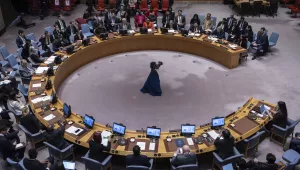President Bush failed Africa last week. His swift leapfrog from capital to capital was heavy on photo opportunities and platitudes but light on accomplishments and policy articulations. The president meant well, but Africa needs promises of concrete action; none were enunciated. Many and momentous were the missed opportunities, particularly so for someone expressing a newfound compassion for Africa.
Bush's biggest bungle was over Zimbabwe, giving dictator Robert Mugabe an unnecessary propaganda victory. Before going to Africa, Bush and Secretary of State Colin Powell had demanded his ouster. Both had appealed to President Thabo Mbeki of South Africa for help in removing him.
But Bush's conversations with Mbeki in Pretoria about Zimbabwe proved empty. With Powell looking on lamely, Bush either bought into or simply let Mbeki declare optimistically that South Africa's ongoing quiet diplomacy was about to reconcile Mugabe and Morgan Tsvangirai of Zimbabwe's Movement for Democratic Change, his chief challenger. Tsvangirai quickly refuted Mbeki's claim. Mbeki's statements were at best misleading.
Unlike in Iraq and Afghanistan, Bush cannot intervene in Zimbabwe. Although Mugabe has harmed his own people as maliciously as Saddam Hussein did in Iraq, Bush will refrain from direct action. But he missed the chance to express a loathing of Mugabe's evil regime on African soil. Surely Mugabe's brutalities merit attention equal to those accorded the axis of evil? Surely Washington campaigns with equal fervor against corrupt regimes whether they be Arab, Asian, or African?
Likewise, Bush failed to commit the United States decisively to help Africa combat internal conflict. He dithered publicly about the killing fields in Liberia, said nothing new about hostilities in Congo, overlooked the week's clashes in Burundi, and said little about pursuing peace in Sudan. Bush persistently refused to say whether he would send desperately needed US troops to curb warfare in Liberia. Nor did he appear to attach any high priority to backing energetically the much-needed UN peacekeeping intervention in Congo.
About 10 million Africans have died in civil wars in Africa since 1990. The Clinton administration's 1993 withdrawal from Somalia and its failure to counter the 1994 Rwanda genocide are clear stains on the US moral record. Bush had a perfect opportunity in Senegal, where he met with several West African presidents, in South Africa and Botswana, in Uganda, and then finally in Nigeria, whose troops helped limit mayhem in Sierra Leone and Liberia in the 1990s, to commit at least a few thousand US troops to African peacemaking duty.
Instead of declaring the United States squarely in favor of peace enforcement and promising to put money and personnel behind the task, Bush on Friday even praised President Yoweri Museveni of Uganda, one of the backers of rebel turmoil in Congo, as a man of peace. Museveni is a strong-arm leader who runs a virtual single-party state.
Bush traveled to Africa to promote his well-intended ethical crusade against the HIV/AIDS pandemic. Even if Congress claims that the president is not campaigning hard enough to fund his AIDS initiative on Capitol Hill, the president does aim squarely to help prevent and fight the dreadful disease.
Yet in Pretoria, Bush missed a key opportunity to push Mbeki hard on providing antiretroviral drugs (as Botswana has done) to AIDS patients in his own country, where more than 20 percent of all adults are HIV positive. South Africa has been slow to offer such help, and Mbeki, unlike Museveni and President Festus Mogae of Botswana has publicly doubted global scientific wisdom about the transmission of AIDS. Bush received no commitment that Mbeki would do better, even with US funding, to help South Africa's desperate and long-suffering people.
Bush has also promised to assist African countries that are being ruled well, such as Botswana and Senegal, with a $5 billion Millennium Challenge Account. Aid from the Challenge Account will be conditioned on honest efforts to improve the way in which Africans govern themselves. However, as he traveled around Africa, the president said almost nothing about how critical good governance is to economic performance and to the cessation of conflict. Nor did he promise to battle Congress to reduce the US agricultural subsidies that cripple Africa's ability to export farm crops to the world's largest market. Trade is better than aid, but Bush never made that case explicitly.
One of the photographs taken of the presidential party showed him close to elephants in Botswana's little Mokolodi Game Reserve. What the photo captions failed to reveal was that the elephants in that reserve are all tame and controlled by trainers from Sri Lanka. That is the metaphor for Bush's missed moments in Africa. His swift tour failed to engage the real Africa and its ongoing problems.


